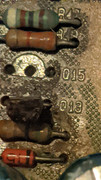Looking to accumulate parts to recap an old 80's vintage amp that had Capacitor bulge and some transistor degradation. Have the service manual and identified the needed replacements.
Question:
The 2 big caps on the main board, a 8000uf 45vdc need replacement (bulge, hum).
Since the cost of going high end isn't much- but they tend not to make them in these specs, can I go higher? I know that they are +-20% but can I go with a 10000uf 63vdc cap that is higher quality or a lower quality one with exact specs?
Second
3 transistors on the main pcb look a bit toasted, but I am having some difficulty procuring them. Read the HK amps tend to be heaters.
These are the models:
2SC115 (F or E)
2SC817 (Y OR O)
2SC2603 (F)
Do I have to get the specs then try to match them? IF so, which specs in a transistor is most important?
Question:
The 2 big caps on the main board, a 8000uf 45vdc need replacement (bulge, hum).
Since the cost of going high end isn't much- but they tend not to make them in these specs, can I go higher? I know that they are +-20% but can I go with a 10000uf 63vdc cap that is higher quality or a lower quality one with exact specs?
Second
3 transistors on the main pcb look a bit toasted, but I am having some difficulty procuring them. Read the HK amps tend to be heaters.
These are the models:
2SC115 (F or E)
2SC817 (Y OR O)
2SC2603 (F)
Do I have to get the specs then try to match them? IF so, which specs in a transistor is most important?
Definitely replace the caps with better ones, but don't replace the transistors unless they are actually defective.
Last edited:
I agree with Rayma, use the better spec caps. There are transistor equivalent tables available on the net. If you have to substitute a transistor in one channel it's best to change the corresponding transistor in the other channel to keep the sound symmetrical.
An externally hosted image should be here but it was not working when we last tested it.
An externally hosted image should be here but it was not working when we last tested it.
I've worked on a TI DFSII system that sunk in the Mediterranean sea, was immersed in tubs of DI water for the ride to Houston, then dried out in an environmental chamber. Barring some connector motor & bearing problems, the transistors & IC's mostly worked fine.
Do a diode test b-e and c-e with the DVM before condemning transistors. 450 to 700 mv usually are okay. If they don't read infinity backwards that is probably because they have a load on them.
One thing that can happen over the decades, the oil dries out of the heat sink compound and it becomes less conductive. Also the mica insulators to the heat sink can break down.
Other age sensitive parts, connectors can oxidize, pot wipers lose connection, fan bearings can dry out or get loose from the hours on.
Do a diode test b-e and c-e with the DVM before condemning transistors. 450 to 700 mv usually are okay. If they don't read infinity backwards that is probably because they have a load on them.
One thing that can happen over the decades, the oil dries out of the heat sink compound and it becomes less conductive. Also the mica insulators to the heat sink can break down.
Other age sensitive parts, connectors can oxidize, pot wipers lose connection, fan bearings can dry out or get loose from the hours on.
Last edited:
This is not likely to be a problem, just diode test it.
Never replace parts unless you actually know they are bad first.
Never replace parts unless you actually know they are bad first.
since I am in there and its cheap- will recap all the electrolytics on the main and phono board. good learning experience.
25 year old electrolytic caps are like tires. Just because they hold air (water) today doesn't mean they will tomorrow. Change 2 at a time then sound test; then if worse you'll know right where the bad solder joint is.
- Home
- Amplifiers
- Solid State
- Recapping & Transistor Question

